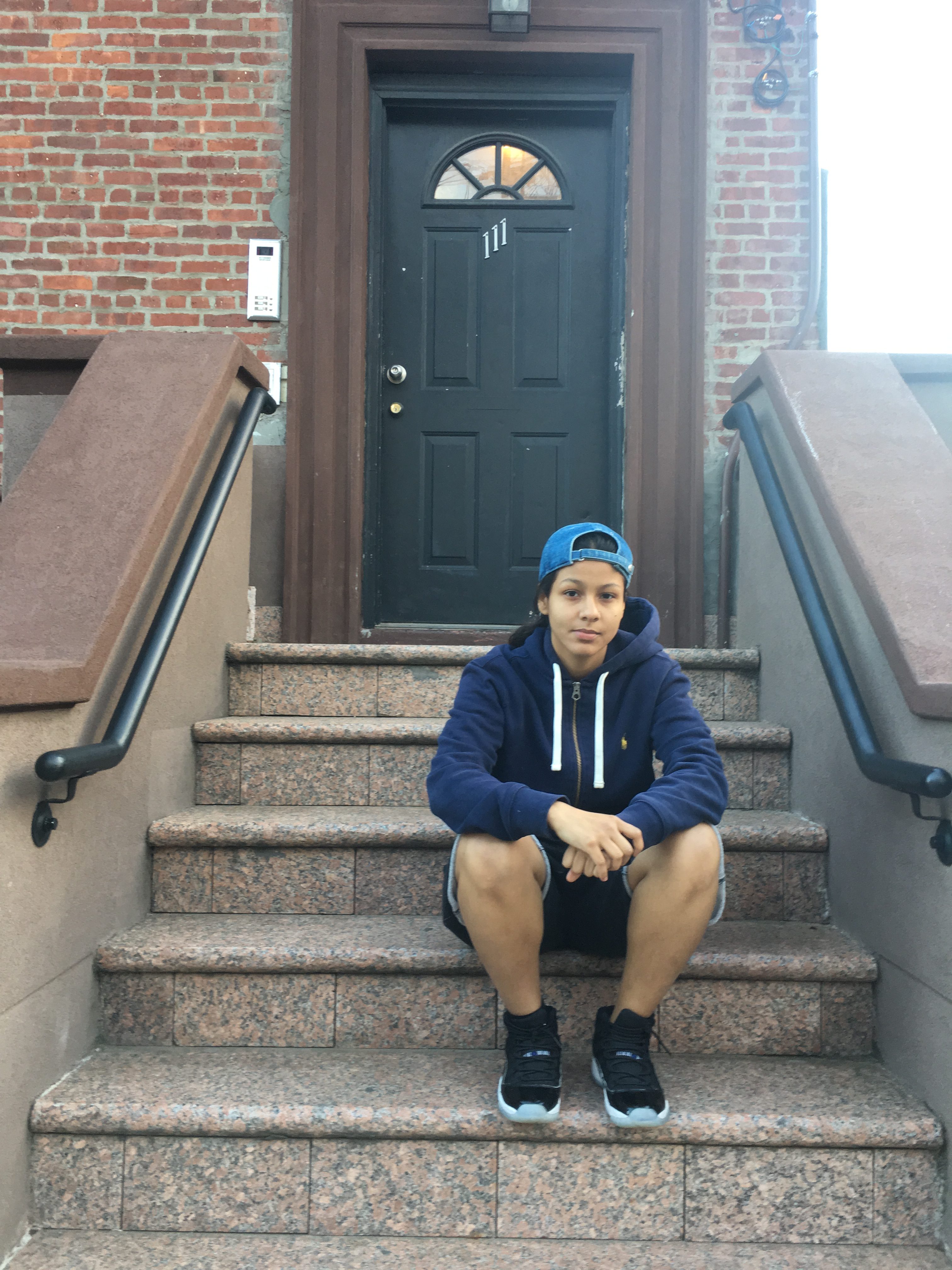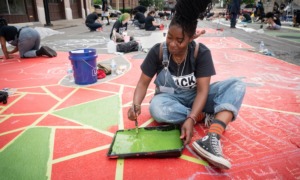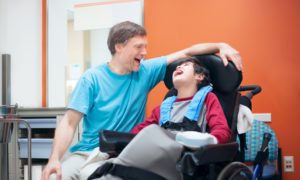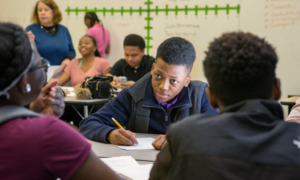Clarissa Sosin
Editor’s note: Our publisher Leonard Witt is doing an Ask Me Anything today at 11 a.m. ET. Tune in on Reddit
NEW YORK — Mariah Charles woke up on Tuesday faced with a difficult decision. Does she take a plea to a crime she didn’t commit or go to trial — face the two officers who slammed her to the ground, arresting her on her way to school — and risk losing.
On the morning of April 28, 2017, Charles, 19 at the time, was on her way to her high school. Instead, she was thrown head first into the back of a New York Police Department squad car. Now, more than a year later, her case has wended its way through the courts.
 About half an hour before appearing in front of a judge, she was still debating what to do. She sat by herself in the hallway of Brooklyn Criminal Court amid the clamor of lawyers and clients. She looked younger than 20 with her hair in a frizzy bun, wearing black baggy knee-length shorts and an oversized white T-shirt with “The Good Weekend” emblazoned across the front.
About half an hour before appearing in front of a judge, she was still debating what to do. She sat by herself in the hallway of Brooklyn Criminal Court amid the clamor of lawyers and clients. She looked younger than 20 with her hair in a frizzy bun, wearing black baggy knee-length shorts and an oversized white T-shirt with “The Good Weekend” emblazoned across the front.
After checking her phone for a while, she was joined by her Legal Aid attorney, Robert Heilbrun, and Dennis Flores, cop watcher and co-founder of community organization El Grito de Sunset Park. She stared down at the ground while the two men debated the pros and cons of taking what is commonly called an ACD.
It is hard to know how many young people in New York City are faced with the decision to accept an adjournment in contemplation of dismissal, commonly referred to by its initials, ACD. Often, it is offered by the district attorney’s office to grease the wheels of justice and not clog the system with minor offenses. The law stipulates that if you are not arrested again within six months of taking the plea, the charges will be dismissed.
Critics of ACDs say it incentivizes defendants to take a plea, even if they feel they are innocent. Going to trial opens the possibility of a conviction and a stiff sentence, so it is common for defense attorneys to recommend taking an ACD.
“It’s the DA’s go to sweep it under the rug move,” said Jason Del Aguila, a community justice organizer with VOCAL-NY who came to support Charles in court.
The decision

Clarissa Sosin
Mariah Charles still doesn’t understand why she was arrested, but said, “I want to teach others and open up my generation’s eyes to what we’re going through.”
Taking an ACD can adversely affect a civil case someone like Charles might bring, charging abuse at the hands of the NYPD. And the charges remain on your record. New York does not expunge records. The records can be sealed, but that only prevents them from being seen by the public. Any number of local, state and federal governmental agencies can see what’s in the sealed records.
“I’m not telling you to take it or not to take it,” Heilbrun told Charles. “My job is to make sure you don’t get a criminal record.”
Flores explained that taking the plea could have negative legal consequences.
Charles listened silently, chewing her gum.
About a half hour later, she made her intentions clear. When a court officer called her name, she and her attorney stood before the judge. Her hands behind her back, she nervously scratched her chin with her shoulder, her jaw still working over the gum. Her lawyer announced she would not be taking the plea and that they would go to trial. The judge set a trial date of July 9.
The charges, resisting arrest and obstructing governmental administration, stem from her encounter with the NYPD while walking to school last year. That was captured on a surveillance camera.
Surveillance video from local business
Captured on camera
Charles was walking to school down Wolcott Street in Red Hook, a waterfront neighborhood in Brooklyn, with her friend Danielle Ward, 17. They were debating whether it was better to be a police officer or in the Coast Guard. Charles was arguing the merits of being a police officer, a career she was considering after high school.
“I was like, Coast Guard going to have way more respect,” Ward said. “That’s the last thing I remember talking about.”
Then an NYPD squad car pulled over. An officer and a sergeant approached them and asked where they were going.
Charles said she was on her way to her school, the South Brooklyn Community School, where she was a junior at the time. The sergeant asked for identification. She said she didn’t have any, but that he could walk her to her school. It’s just around the corner on Conover Street and less than a block away.
“If someone don’t have ID they literally walk with you to school so that’s what’s I thought they were going to do. And I thought wrong,” Charles said.
She tried to continue on her way when the officer grabbed her arm and blocked her way. She stopped walking and he dropped her arm. They spoke for a second longer, then Charles took a few more steps toward school.
That’s when the officers elevated the level of force.
As Charles went to go around him, the officer grabbed her arms and pulled them behind her back. The other officer, who was talking to Ward a couple of feet away, came over to help restrain Charles. With one cop on each arm, Charles began to struggle. She is thin, 5 foot 2 and weighs about 120 pounds. They pulled her this way and that.
“I’m going to school and I’m a female,” she screamed. “You’re touching me and I’m a female. What are you doing? What are you doing?”
Finally, the officers forced her to the ground.
All the while a stunned Ward, unsure whether or not she was going to be arrested too, stood there watching and filming.
“Yo! What are you all doing?” she said.
“Somebody go to my school!” Charles yelled. “Somebody go to my school. Danny, please go to my school. Danny, please.”
Ward walked away quickly to find someone at the school to help, leaving her friend cuffed on the ground with the two officers pinning her down.
Once Ward was gone, the officers stood up. One held onto Charles while the other opened the squad car door. Realizing they were going to put her in the car, she began to struggle again. They pushed her onto the ground, lifted her up sideways and threw her into the backseat head first.
[Related: Trauma of Her Violent Arrest Lingers, Even As Young New Yorker Beats the System]
Then they stood at the open door as bystanders began to gather. Charles stood up and got out of the car, her backpack dangling around her cuffed wrists. As she began to shuffle slowly toward the sidewalk, the closest officer pulled on her shirt, making her fall toward him, and pushed her back inside the open car door. With the second officer’s help, the two violently shoved Charles back in and slammed the door. Seconds later, they got into the car and drove away.
It lasted less than five minutes.
The aftermath
Several days later, Ward and Charles went back to where it happened with Flores of El Grito. They watched the footage Ward took of the arrest, dissecting that day.
Dennis Flores
Sources familiar with the case said that the two police said they stopped the pair and asked for ID as part of a truancy stop.
But Charles, who was 19 at the time, is older than the legal dropout age of 17.
And in New York City you are not legally required to have an ID, and you don’t need to show one to a police officer unless the officer has reasonable suspicion that you have committed, are committing or about to commit a crime.
“I feel confused,” Charles said. “I don’t understand why them cops did it.”
It remains unclear why the sergeant and officer from the 76th Precinct stopped her. Police didn’t respond to a request to comment. A spokesperson from the Brooklyn District Attorney’s office declined to comment because the case is pending.
As she left the courthouse after the brief hearing Tuesday, Charles explained why she made the decision.
“I didn’t feel I should go with the easiest decision,” she said. “Me taking an ACD is saying that it’s OK — it’s OK what they did.”
She leaned against the front of the Brooklyn Criminal Court building and waited for her mother to meet her. She feels a sense of obligation to take her case to trial and tell other people her age about the civil rights abuses they face.
“I feel like I want to teach others and open up my generation’s eyes to what we’re going through,” Charles said.
But that doesn’t mean she isn’t still anxious.
Her mother, Maria Feliz, came over to her and said, “You comfortable? You OK?”
Charles shrugged. “I’m a little nervous,” she said.
“You’re going to feel nervous but don’t be because you didn’t do nothing wrong,” Feliz replied.
Charles said she’s ready for trial. When it’s all done she still plans on finishing school. But she’s not so sure about joining the police department anymore.































